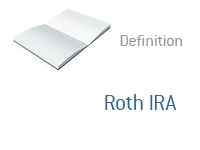Definition of Roth IRA
What is a "Roth IRA"? What is the definition of the term "Roth IRA"?
Roth IRAs are similar to traditional IRAs, but there are a couple of MAJOR differences.
A contribution to a traditional IRA (Individual Retirement Account) may be tax-deductible, while a contribution to a Roth IRA is not tax deductible.
Let's break this down - a qualifying contribution to a traditional IRA will reduce your tax burden in the year in which you make your contribution, while a contribution to a Roth IRA is made in after-tax dollars.
 Now, here is the flip side to this: a qualified distribution (withdrawal) from a Roth IRA is NOT subject to tax, while a distribution from a traditional IRA account is subject to tax when it is withdrawn.
Now, here is the flip side to this: a qualified distribution (withdrawal) from a Roth IRA is NOT subject to tax, while a distribution from a traditional IRA account is subject to tax when it is withdrawn. The point of the traditional IRA is to help partially defer your tax burden until a time when you are paying a lower amount of tax (retirement). In the Roth IRA, you have already paid taxes on the money that you are investing, so if it is a qualifying distribution, it will not be subject to tax.
Investment gains grow tax-free in both a traditional IRA and Roth IRA account. The difference is that you will have to pay tax on a traditional IRA distribution (tax on the amount that you invested PLUS the tax on any gains), while a qualified Roth IRA distribution will not be subject to tax (contributions and gains).
What is a qualified distribution (distribution that is not subject to tax or penalty) for a Roth IRA account? From IRS.gov:
-must be five years from the beginning of the year in which you set up and contributed to a Roth IRA
And:
-made on or after the date that you turned 59 1/2
or
-made because you are disabled
or
-made to a beneficiary of your estate after your death
or
-used to buy or rebuild a first home (up to a $10,000 lifetime limit, subject to certain conditions)
--
Davemanuel.com Articles That Mention Roth IRA:
The Scary Financial State of Many US Households
Open an IRA - Where Should You Open Your IRA?
